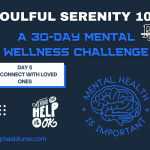In a world filled with challenges and uncertainties, it’s easy to get caught up in the chaos of daily life, often overlooking the simple yet profound practice of gratitude. Gratitude, often regarded as a fundamental virtue in various spiritual and philosophical traditions, has a transformative power that extends far beyond mere thankfulness. It has the potential to shape our spiritual and personal growth in ways that can be both enlightening and empowering.
This article explores the profound impact of gratitude on our spiritual and personal development. We’ll delve into its roots in ancient wisdom, its scientific underpinnings, and practical ways to cultivate gratitude in our lives. Through this journey, we will uncover the depth of its influence on our well-being, relationships, and overall sense of purpose.
The Roots of Gratitude in Spiritual Traditions
Gratitude is not a modern invention but a virtue that has deep roots in various spiritual and philosophical traditions around the world. Let’s take a closer look at how gratitude has been valued in these traditions.
1. Ancient Wisdom of Gratitude in Eastern Traditions
Eastern philosophies such as Buddhism and Taoism have long emphasized the importance of gratitude. In Buddhism, gratitude is regarded as an essential component of contentment and inner peace. The practice of mindfulness, often associated with Buddhism, encourages individuals to cultivate gratitude for the present moment and all the blessings it contains.
Similarly, Taoism teaches that gratitude opens the door to harmony with the Tao, or the natural way of the universe. The Tao Te Ching, a foundational text in Taoism, emphasizes the importance of being thankful for both the good and the bad, as they are all part of the intricate tapestry of life.
2. Gratitude in Judeo-Christian Traditions
In Judeo-Christian traditions, gratitude is deeply woven into religious practices. The Bible contains numerous verses that exhort believers to offer thanks to the Divine. In Christianity, gratitude is considered a form of worship and a means to cultivate humility and faith. The act of giving thanks is central to the Eucharist, a Christian sacrament commemorating the Last Supper.
Judaism also places a significant emphasis on gratitude, with daily prayers like the Modeh Ani encouraging Jews to express gratitude for the gift of life each morning. The Jewish holiday of Thanksgiving, or Sukkot, underscores the importance of thankfulness for the harvest and the blessings of life.
3. Gratitude in Indigenous Traditions
Indigenous cultures around the world have long recognized the importance of gratitude in their spiritual practices. Many indigenous rituals and ceremonies involve expressions of thanks to the Earth, the elements, and the spirits that inhabit the natural world. These traditions highlight the interconnectedness of all living beings and the land, fostering a deep sense of gratitude for the sustenance and wisdom provided by nature.
Scientific Insights into Gratitude
Beyond its historical and spiritual significance, gratitude has garnered attention from the scientific community in recent years. Research in psychology and neuroscience has shed light on the tangible benefits of cultivating gratitude in one’s life.
1. Positive Psychology and Gratitude
Positive psychology, a field of psychology dedicated to the study of human well-being and flourishing, has explored the concept of gratitude extensively. Researchers like Martin Seligman and Robert Emmons have conducted studies that highlight the positive effects of gratitude on mental and emotional well-being.
Gratitude has been linked to increased happiness, reduced symptoms of depression, and improved overall life satisfaction. It can help individuals focus on the positive aspects of their lives, even in challenging circumstances, fostering resilience and emotional well-being.
2. The Neurobiology of Gratitude
Neuroscientists have also delved into the neural mechanisms underlying gratitude. Studies using neuroimaging techniques like fMRI (functional magnetic resonance imaging) have shown that practicing gratitude activates brain regions associated with reward, empathy, and social bonding. These regions include the ventral striatum and the anterior cingulate cortex.
Additionally, gratitude practices have been found to increase the production of neurotransmitters like dopamine and serotonin, which are associated with feelings of happiness and well-being. This neurobiological perspective suggests that gratitude is not just a fleeting emotion but a neurologically grounded state of mind that can be cultivated.
3. Gratitude and Physical Health
Gratitude doesn’t only benefit our mental and emotional well-being; it also has a positive impact on our physical health. Numerous studies have shown that individuals who regularly practice gratitude report better sleep, lower levels of stress, and improved immune function. Grateful people are more likely to engage in health-promoting behaviors like exercise and maintaining a balanced diet.
The Power of Gratitude in Personal Growth
Now that we’ve explored the historical and scientific aspects of gratitude, let’s delve into its profound influence on personal growth.
1. Fostering Resilience
Life is full of challenges, setbacks, and uncertainties. Cultivating gratitude can be a powerful tool for building resilience—the ability to bounce back from adversity. When we practice gratitude, we train our minds to focus on the positive aspects of our lives, even during difficult times. This shift in perspective can help us navigate challenges with greater emotional strength and optimism.
2. Strengthening Relationships
Gratitude is not limited to self-reflection; it extends to our interactions with others. Expressing gratitude to loved ones can strengthen our relationships and foster a sense of connection. When we acknowledge and appreciate the people who enrich our lives, we create a positive feedback loop of goodwill and reciprocity. Gratitude enhances empathy and helps us recognize the kindness and support we receive from others, leading to deeper and more meaningful connections.
3. Enhancing Emotional Well-being
Emotional well-being is a key component of personal growth, and gratitude plays a pivotal role in enhancing it. By regularly practicing gratitude, we train our minds to focus on the positive aspects of our lives. This shift in perspective reduces the grip of negative emotions such as anger, envy, and resentment. Instead, we experience greater levels of contentment, joy, and inner peace.
4. Fostering a Growth Mindset
A growth mindset is the belief that our abilities and intelligence can be developed through dedication and hard work. Gratitude is closely related to this mindset as it encourages us to view challenges and failures as opportunities for growth. When we are thankful for the lessons we learn from adversity, we become more resilient and open to personal development.
Practical Ways to Cultivate Gratitude
Now that we’ve explored the myriad benefits of gratitude, let’s delve into some practical ways to incorporate gratitude into our daily lives.
1. Keep a Gratitude Journal
One of the most effective ways to cultivate gratitude is by keeping a gratitude journal. Each day, take a few minutes to write down three to five things you are grateful for. These can be big or small, from the people in your life to the beauty of nature or a simple act of kindness you experienced. Over time, this practice can shift your focus toward the positive aspects of life.
2. Practice Mindful Gratitude
Mindfulness involves being fully present in the moment, and mindful gratitude combines these two powerful practices. When you engage in mindful gratitude, take a moment to pause and appreciate the beauty and abundance around you. It could be the warmth of the sun on your skin, the taste of a delicious meal, or the laughter of a loved one.
3. Express Gratitude to Others
Don’t hesitate to express your gratitude to the people who make a positive impact on your life. Write heartfelt thank-you notes, send messages of appreciation, or simply tell someone in person how much you value their presence. Acts of gratitude not only make others feel appreciated but also strengthen your connections.
4. Reflect on Challenging Experiences
Even difficult moments can be opportunities for growth and gratitude. When faced with challenges, take a step back and reflect on the lessons they bring. What have you learned? How have you grown? Acknowledging the silver linings in adversity can help you maintain a positive outlook.
5. Create a Gratitude Ritual
Incorporate gratitude into your daily routine by creating a gratitude ritual. Whether it’s a morning meditation, a daily prayer, or a moment of reflection before bedtime, establish a regular practice that reminds you to be thankful. Consistency is key to reaping the long-term benefits of gratitude.
6. Volunteer and Give Back
One of the most profound ways to experience gratitude is by giving back to others. Volunteering and helping those in need can provide a powerful perspective on the blessings in your life. It reinforces the idea that gratitude is not just about receiving but also about giving and contributing to the well-being of others.
Conclusion
Gratitude is a timeless and universal virtue that holds immense power in shaping our spiritual and personal growth. It has deep roots in ancient wisdom and is supported by scientific research that highlights its positive impact on mental, emotional, and physical well-being.
By practicing gratitude in our daily lives, we can foster resilience, strengthen relationships, enhance emotional well-being, and develop a growth mindset. Gratitude is not a passive emotion but an active practice that invites us to shift our perspective and appreciate the abundance and beauty that surrounds us.
In a world often characterized by busyness and distraction, cultivating gratitude offers us a profound opportunity to reconnect with the essence of our humanity and embark on a journey of spiritual and personal growth. As we embrace the power of gratitude, we find that it not only enriches our own lives but also ripples outward, touching the lives of those around us, and contributing to a more compassionate and harmonious world.




